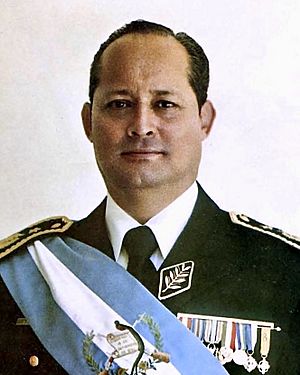Carlos Manuel Arana Osorio facts for kids
Quick facts for kids
Colonel
Carlos Arana Osorio
|
|
|---|---|

Official portrait, 1970
|
|
| 35th President of Guatemala | |
| In office July 1, 1970 – July 1, 1974 |
|
| Vice President | Eduardo Cáceres |
| Preceded by | Julio César Méndez Montenegro |
| Succeeded by | Kjell Laugerud |
| Personal details | |
| Born | July 17, 1918 Barberena, Santa Rosa, Guatemala |
| Died | December 6, 2003 (aged 85) Guatemala City, Guatemala |
| Political party | Movimiento de Liberación Nacional |
| Spouse | Alida España (died 1993) |
| Residence | Guatemala City |
| Occupation | Military |
| Military service | |
| Allegiance | |
| Branch/service | Guatemalan Army |
| Rank | General |
Carlos Manuel Arana Osorio (born July 17, 1918 – died December 6, 2003) was a military officer and politician from Guatemala. He served as the president of Guatemala from 1970 to 1974. His time as president was a period of significant conflict and challenges for human rights in the country. Many people were affected during his administration.
Contents
Early Life of Carlos Arana Osorio
Carlos Arana Osorio was born in Barberena, a town in the Santa Rosa region of Guatemala. This was on July 17, 1918. He was the nephew of Francisco Javier Arana, who was also an important military leader in Guatemala's history. Carlos Arana Osorio decided to join the military and became an officer. He was also a politician who was against communism. In 1955, he became the director of a special military school called the Polytechnic School.
Military Career
As a colonel in the Guatemalan Army, Arana was in charge of efforts to stop rebel groups in areas like Zacapa and Izabal. This was between 1966 and 1968. During this time, there was a lot of fighting and many people were harmed.
Under Colonel Arana's command, military leaders worked with other groups. These groups sometimes acted secretly against people thought to be helping the rebels. The military provided these groups with people, weapons, money, and instructions. These groups often acted without being stopped by the government. Many civilians were affected during these operations.
Some people called the government's actions during this time "White Terror." This term was used to describe periods of intense conflict and anti-rebel actions in other countries too.
Presidency (1970–1974)
In July 1970, with the support of the Army, Colonel Carlos Arana Osorio became president. He was the first of several military leaders from the Institutional Democratic Party to lead Guatemala in the 1970s and 1980s. Before becoming president, Arana had worked as an ambassador in Nicaragua.
When he became president, Arana said he would do whatever was needed to bring peace to the country. Even though there wasn't much rebel activity at the time, he declared a ""State of Siege"" in November 1970. During this "State of Siege," there was a daily curfew from 9:00 PM to 5:00 AM. No one was allowed to be outside, not even ambulances or doctors.
The "State of Siege" meant that the government increased its control. There were more instances of people being taken away, disappearing, or being killed without a trial.
The "State of Siege" lasted until the end of 1972. At that time, Arana's government announced that the rebel groups had been defeated. During this period, many members of a political party called the PGT also disappeared. Between January and September 1973, the Guatemalan Human Rights Commission reported that many people died or disappeared because of government-linked groups. Because of these actions, international human rights organizations described the Guatemalan government as one of the most controlling in the world. Amnesty International even mentioned Guatemala as a country facing a human rights crisis. It is estimated that about 20,000 people were killed or disappeared between 1970 and 1974 under Arana's government.
Later Life
After his time as president, Carlos Arana Osorio stepped away from politics. He started a new political party called Central Auténtica Nacionalista (CAN). This party took part in some elections but did not have a big impact. He passed away in December 2003.
See also
 In Spanish: Carlos Manuel Arana Osorio para niños
In Spanish: Carlos Manuel Arana Osorio para niños
 | James B. Knighten |
 | Azellia White |
 | Willa Brown |

